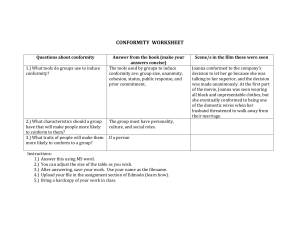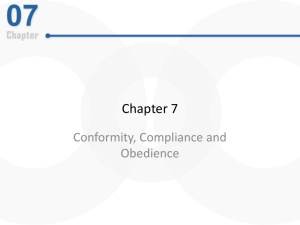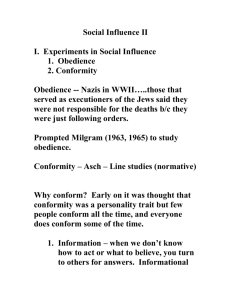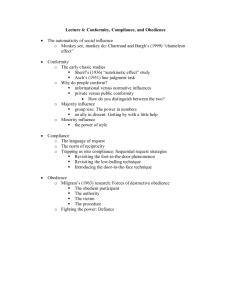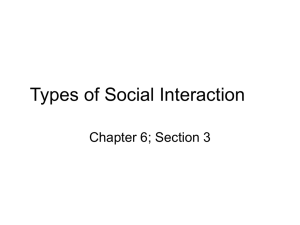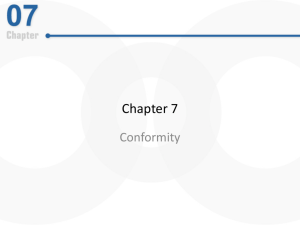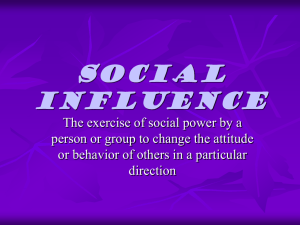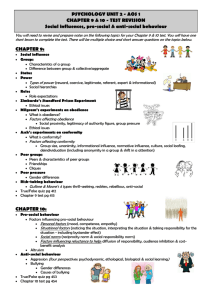Document
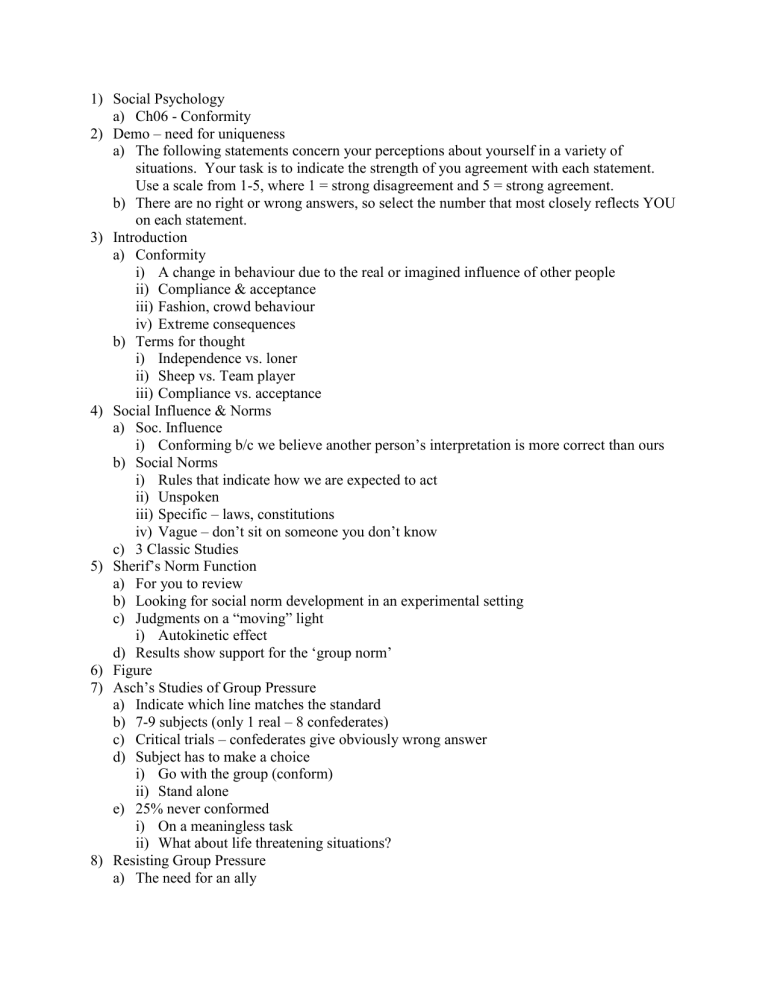
1) Social Psychology a) Ch06 - Conformity
2) Demo – need for uniqueness a) The following statements concern your perceptions about yourself in a variety of situations. Your task is to indicate the strength of you agreement with each statement.
Use a scale from 1-5, where 1 = strong disagreement and 5 = strong agreement. b) There are no right or wrong answers, so select the number that most closely reflects YOU on each statement.
3) Introduction a) Conformity i) A change in behaviour due to the real or imagined influence of other people ii) Compliance & acceptance iii) Fashion, crowd behaviour iv) Extreme consequences b) Terms for thought i) Independence vs. loner ii) Sheep vs. Team player iii) Compliance vs. acceptance
4) Social Influence & Norms a) Soc. Influence i)
Conforming b/c we believe another person’s interpretation is more correct than ours b) Social Norms i) Rules that indicate how we are expected to act ii) Unspoken iii) Specific – laws, constitutions iv) Vague – don’t sit on someone you don’t know c) 3 Classic Studies
5)
Sherif’s Norm Function a) For you to review b) Looking for social norm development in an experimental setting c)
Judgments on a “moving” light i) Autokinetic effect d) Results show support for the ‘group norm’
6) Figure
7)
Asch’s Studies of Group Pressure a) Indicate which line matches the standard b) 7-9 subjects (only 1 real – 8 confederates) c) Critical trials – confederates give obviously wrong answer d) Subject has to make a choice i) Go with the group (conform) ii) Stand alone e) 25% never conformed i) On a meaningless task ii) What about life threatening situations?
8) Resisting Group Pressure a) The need for an ally
i) One confederate breaks from group consensus ii) 3 different ways b) Conformity is reduced i) Unanimity must be broken c) Written instead of verbal answers d) No physical presence
9)
Milgrim’s Obedience Studies a) Experiment to study effect of punishment on learning i)
‘Teacher – student’ ii) Punish for every wrong answer iii) Increasing levels of shock iv) No shock was actually administered b) How far will people go? i) The true nature of the study ii) Studying the effects on the teacher, not the student c) Experts predicted less than 5% compliance i) Results indicated close to 65% (over 1000 subjects) ii) People will obey, without limits of conscience, when they believe that the order comes from a legitimate authority
10) What Breeds Obedience? a) Emotional Distance of the Victim i) Personalizing the victim ii) Who would you save? b) Closeness and legitimacy of authority i) Physical distance ii) Institutional authority (commercials in class) c) Liberating group influence i) Need one other to rebel d) Reflections on classic studies
11) FAE revisited a) Behaviour prediction i) What we would consciously feel ii) Underestimate the power of the situation (which we can’t predict in advance) b) Safer (1980) i) People often mistakenly conclude that other people are evil ii) Missing the point of the experiment iii) Subjects were not evil – the merely conformed to the situation iv) Students who are aware of these results will often OVER-estimate the level of conformity c) Necessary for survival in some situations
12) Why conform? a) Group size i) Conformity increases with group size b) Unaninimity i) It is extremely important that ALL group members agree c) Cohesion
i) The degree of attraction felt by individuals towards a group (peer pressure !!) d) Status i) Both real and perceived e) Public Response i) Responses have to be made in the presence of someone else f) No Prior Commitment i) Once a public statement has been made, change is hard
13) Why conform? part II a) 2 basic needs i) The desire to be liked or accepted by others ii) The desire to be right b) Normative Social Influence i) How can we get others to like us? ii) Alter our behaviour to meet their expectations c) Informational Social Influence i) Establish the accuracy of your views ii) Other people used as an informational source to judge our own views
14) Who Conforms? a) Gender i) Early studies indicated females ii) Recent studies indicate task demands important iii) Status issues (perceived or real) iv) May be very little actual difference b) Culture i) Independent cultures show less conformity ii) Ingroup and outgroup pressures
15) Resisting Social Pressure a) Reactance i) People don’t like to lose sense of freedom ii) But sometimes conform to another ideal b) Asserting Uniqueness
(1) Everyone likes to be the exception to the rule
(2) Until someone notices
(3) Social situations amplify uniqueness
